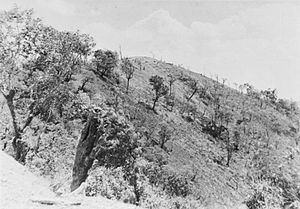Operation U-Go
| U Go offensive | |||||||
|---|---|---|---|---|---|---|---|
| Part of the Burma Campaign of the Second World War | |||||||
 The summit of Nippon Hill, east of Imphal, which was hotly contested during Operation U-Go |
|||||||
|
|||||||
| Belligerents | |||||||
| Commanders and leaders | |||||||
|
|
|
||||||
| Strength | |||||||
| 7 infantry divisions 1 tank brigade 2 infantry brigades |
5 infantry divisions 1 tank regiment 84,280 men (excluding INA) |
||||||
| Casualties and losses | |||||||
| 16,987-21,500 |
15th, 31st, and 33rd Divisions: 12,443 killed 1,652 missing in action 8,407 dead from disease Misc. Army Troops: 8,000 dead from all causes Total: 30,502 dead, 23,003 hospitalized |
||||||
The U Go offensive, or Operation C (ウ号作戦), was the Japanese offensive launched in March 1944 against forces of the British Empire in the northeast Indian regions of Manipur and the Naga Hills (then administered as part of Assam). Aimed at the Brahmaputra valley, through the two towns of Imphal and Kohima, the offensive along with the overlapping Ha Go offensive was one of the last major Japanese offensives during the Second World War. The offensive culminated in the Battles of Imphal and Kohima, where the Japanese and their allies were first held and then pushed back.
In 1942, the Japanese Army had driven the British, Indian and Chinese troops out of Burma. When heavy monsoon rains stopped campaigning, the British and Indian troops had occupied Imphal, the capital of Manipur state. This lay in a plain astride one of the few practicable routes over the jungle-covered mountains which separated India and Burma. The Japanese commander in Burma, Lieutenant General Shōjirō Iida, was asked for his opinion on whether a renewed advance should be made into India after the rains ended. After conferring with his divisional commanders, Iida reported that it would be unwise to do so, because of the difficult terrain and supply problems.
...
Wikipedia
